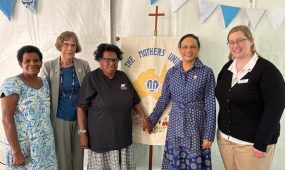National Anglican Family Violence Research Report released
News
The Standing Committee of the Anglican Church of Australia has made 10 Commitments to prevent and respond to Intimate Partner Violence (IPV), after undertaking the first known Australian Church study into the prevalence of IPV within its faith community

The Standing Committee of the Anglican Church of Australia has made 10 Commitments to prevent and respond to Intimate Partner Violence (IPV), after undertaking the first known Australian Church study into the prevalence of IPV within its faith community.
IPV is defined as behaviour within an intimate relationship that causes physical, sexual or psychological harm, including physical aggression, sexual coercion, psychological abuse and controlling behaviours.
The Australian Institute of Family Studies notes IPV is the most common form of family violence used against women in Australia and takes place across all cultures and faith groups.
Convenor of the Anglican Church of Australia’s Family Violence Working Group, The Reverend Tracy Lauersen said the Church has deliberately taken the lead on a broader societal issue.
“Following considerable public discussion in 2016 about IPV, we felt duty-bound to better understand its nature and prevalence in our community and develop and implement more effective responses,” she said.
“As a result, we embarked on a two-year project – three in-depth research reports into the prevalence, a study of clergy and lay leaders, and one-on-one interviews to capture personal experiences within our community.”
The research, commissioned by the Church and conducted by NCLS Research, produced 28 top line findings, which included:
• The prevalence of IPV among Anglicans was the same or higher than in the wider Australian community.
• Women were much more likely than men to have experienced IPV.
• Most Anglican victims of IPV did not seek help from Anglican Churches, but for those that did most reported that it positively changed the situation or helped them feel supported.
• Clergy and lay leaders were well-informed about breadth of IPV and understood that it was more men who commit violence.
• Most clergy felt that having women on the pastoral team equips the Church to better respond to IPV.
• Clergy confidence in their personal capacity to respond to IPV was low to moderate.
• Perpetrators’ misuse Christian teachings and positional power.
Advertisement
“All Anglicans will feel deep sadness over these results,” the Primate of the Anglican Church of Australia, The Most Reverend Geoffrey Smith said.
“But armed with this data we can develop a better response to protect those within our church communities from domestic violence.”
“There is a strong resolve among the Church leadership to address the problem and to provide an appropriate response and adequate support for victims,” he said.
“As a Church, we grieve with the victims and survivors of IPV, we pray for healing and recovery, and we commit to doing more to prevent it happening,” The Reverend Lauersen said.
“This research has lifted the veil and highlighted how big the problem is not just in Australia but within our Anglican community also.”
In response to the research findings, the Anglican Church has developed and endorsed 10 Commitments to improve the way IPV is addressed within its faith community. They are focused on cultural change, education, training and support.
“There is positive work being done by dioceses across the country, but as this research demonstrates there are gaps which we are committed to addressing,” The Reverend Lauersen said.
Advertisement
“We are forever grateful to those that took part in our research project, from members of the Clergy and lay leaders to survivors and victims across the country, for they are helping to drive change in the Anglican Church and, we hope, more broadly across Australia.”
For more information, please visit the Anglican Church of Australia website.
Editor’s note: If you are in immediate danger, call 000 for police or ambulance help. For a list of helplines and websites available to women, children and men, visit this page on the Queensland Government website.





